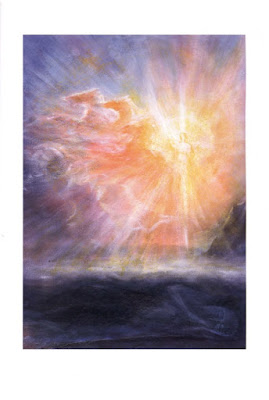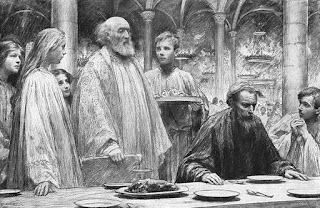2nd,
3rd, 4th Advent
Mark
13:24-37
"In
the days after those hardships,
'the sun will be darkened,
the moon will no longer give its light,
the stars will be falling from heaven,
and the powers of the heavenly spheres will be thrown off course.'
"Then,
the coming of the Son of Man will be visible in the realm of the clouds, invested
with power, illumined by the light of the revelation of the world of spirit.
And he will send out the angels to gather in all those who feel themselves
united with him, from all four winds, from the ends of the earth to the ends of
heaven.
"Learn
from the parable of the fig tree: When the sap rises through its branches, and
it puts forth leaves, then you see that summer is near. So also when you see
these things coming about, you shall be aware that the revelation of the Son of
Man is near, at the very door. Yes, I say to you: Even before the time of human
beings now living shall have come to an end, all this will begin. Heaven and
earth will pass away, but my words will not pass away. No one knows anything
about that day or that hour, not even the angels in heaven, nor the Son, but
only the Father.
"Be observant and be awake, for you do not know when the time will be. It is like when a man goes on a journey and leaves his house. He gives his servants authority, gives each one his task, and tells the doorkeeper to be alert. So you, too, be alert. You do not know when the master of the house will come, whether in the evening or at midnight or at cockcrow in the morning. Take care that he does not find you sleeping if he comes suddenly. And what I say to you applies to all human beings: Be alert!"
2nd Advent
December 5, 2021
Mark 13:24-27
The Advent prayers at the altar speak of the chariot of the sun.
The path of this chariot inscribes an arc in the heavens. The mention of a chariot implies a Being that travels in it. In Greek mythology He is called Helios. Daily he rises from the edge of the world, dispelling the darkness. At the end of the day he sets into the darkness, to rise again, moving time forward.
The prayers also speak of the bow of color, the rainbow,
which also inscribes an arc. The interplay of light and darkness,
of water and air, of Helios and Earth create a many-colored bridge, the rainbow.
The Greeks called her Iris, the winged messenger of the gods. Her message has
always been filled with hope and promise; Helios and Iris, bringers of light,
color and hope.
Our deepest hope is that one day, heaven and earth will
become one; that the wounds of worlds will be healed; that love and peace will
reign because the sons and daughters of sun and earth will have fulfilled Iris’s
promise. Her message continuously calls us, inviting us to work on the creation
of the new heaven and the new earth. All of creation is waiting for us. As the
poet Mary Oliver says
Ookami Kouu
There are days
when the sun goes down
like a fist,
though of course
if you see anything
in the heavens this way
you had better get
your eyes checked
or, better still,
your diminished spirit.
The heavens
have no fist,
…
Instead: such patience!
Such willingness
to let us continue!
David Newbatt
To hear,
little by little,
the voices -
only, so far, in
pockets of the world -
suggesting the possibilities
of peace
Keep looking.
Behold, how the fist opens
with invitation.*
*Mary Oliver, “The Fist”, in Thirst



















